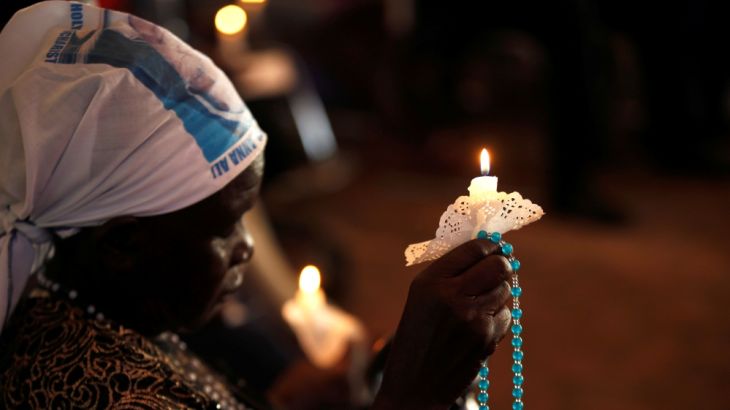
20 years after al-Qaeda attack, Kenyans still bear scars
Around the world, people are marking the 20th anniversary of simultaneous US embassy bombings in Kenya and Tanzania.
Twenty years after the deadly twin bombings at the US embassies in Kenya and Tanzania, survivors still bear scars of the armed group al-Qaeda’s first major attack.
Around the world on Tuesday, people marked the 20th anniversary of the simultaneous attacks in the East African cities of Nairobi and Dar Es Salaam, which left 224 people dead and injured close to 5,000 – mostly Africans.
Keep reading
list of 4 itemsBurkina Faso army strikes killed dozens of civilians, says HRW
Somalia begins ‘efforts to rescue’ UN helicopter crew held by al-Shabab
Al-Shabab captures UN helicopter in central Somalia
In the Kenyan capital, Nairobi, a prayer meeting was held as families of the victims and officials gathered at a memorial park built on the site of the US embassy.
“Twenty years ago today, evil showed its terrible face in Kenya and Tanzania,” Robert Godec, US ambassador to Kenya, told the gathering.
“In an awful moment, the lives of thousands changed forever as did the lives of their families and friends,” he said.
In a separate statement, US Secretary of State Mike Pompeo said that “our partnership with our African allies remains stronger than ever.”
‘Barbaric act’
The explosions on August 7, 1998, marked al-Qaeda’s emergence as a deadly player on the global stage.
Douglas Sidialo, who was blinded in the Nairobi attack, said he was “at the wrong place, at the wrong time”.
“When I lost my eyesight, I became a bitter person,” he said.
“I imagined that if I met the man behind that barbaric and heinous act of cowardice, I would have skinned him alive so that he could feel and experience the pain we are going through as survivors and orphans and widows who have lost their loved ones.”
With time however, he has learnt to accept his blindness as challenge and chose to move on with his life.
He is currently working in the information communications technology sector.
“We are victims, but we cannot be victims forever,” Sidialo, spokesman for the Kenyan victims’ association, told Al Jazeera.
“We have to pick up our pieces and move on with our lives.”
![Family members of victims attend a ceremony at the August 7th memorial park in Nairobi, Kenya [Baz Ratner/Reuters]](/wp-content/uploads/2018/08/eb58ceb037674e15bfb938498f653f69_18.jpeg)
Three years after the carnage in East Africa, al-Qaeda under the leadership of Osama bin Laden went on to stage the September 11 attacks in which nearly 3,000 people died, when a hijacked passenger aircraft hit the Pentagon in Washington, DC, and destroyed the Twin Towers at the World Trade Center, in New York city.
Kenya itself has also been hit by further mass bloodshed.
Two years after the embassy attack, it sent troops across the border into Somalia to fight the al-Qaeda linked al-Shabaab group, which had been staging attacks on its soil.
The group hit back violently, staging a major attack on Nairobi’s Westgate shopping centre in 2013, killing 67 people, and another assault on Garissa University in eastern Kenya two years later, which left 148 dead.
In 2011, the White House said bin Laden had been killed in Pakistan by US special forces and since then, attention has swung away from al-Qaeda to the Islamic State of Iraq and the Levant (ISIL, also known as ISIS) group, which was formed in 2013 and has staged a string of deadly mass attacks around the world.
Experts warn, however, that al-Qaeda has been quietly rebuilding, and that it could be a matter of time before they would strike again.
|
|